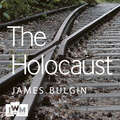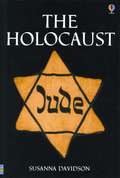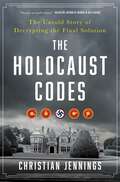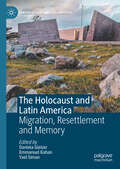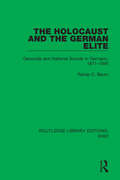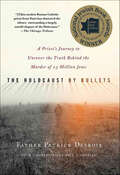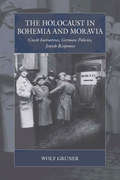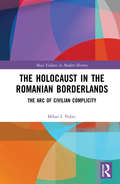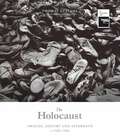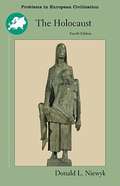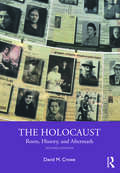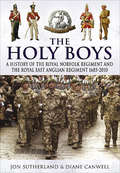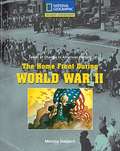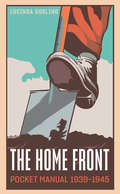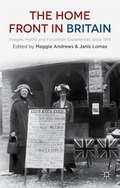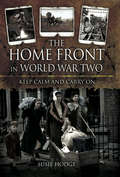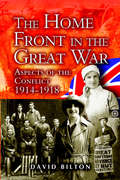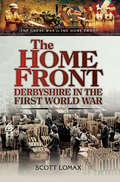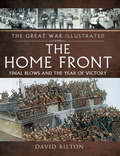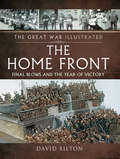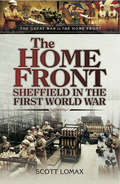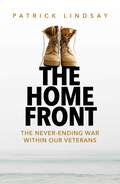- Table View
- List View
The Holocaust
by James BulginDuring the Second World War, the Nazis and their collaborators murdered two-thirds of Europe's Jewish population - six million people. In some parts of Europe this represented the complete annihilation of entire households, families, and communities. Those that survived were forced to live their lives in the shadow of an incalculable loss. They, and the generations that followed, have each had to confront the aftermath of this destruction in their own way.Based on IWM's ground-breaking new Second World War and Holocaust Galleries, this audiobook examines the development of the Holocaust as it appeared to those who witnessed it. By telling the story of the Holocaust through objects and their owners, this audiobook highlights the devastating human cost of the genocide and helps readers to understand one of the darkest periods in modern history.(P)2021 Headline Publishing Group Limited
The Holocaust
by Susanna Davidson"In 1933, there were more than ten million Jews in Europe, but by 1945, six million had been murdered. In some countries, this meant a death toll of nine out of every ten Jews. This mass murder of Jewish people is now known as the Holocaust. The force behind it was the Nazi Party, which came to power in Germany in January 1933. This book looks at the events leading up to it and describes what happened, using historical fact and survivors' stories."
The Holocaust Bystander in Polish Culture, 1942-2015: The Story of Innocence (Palgrave Studies in Cultural Heritage and Conflict)
by Maryla Hopfinger Tomasz ŻukowskiThis book concerns building an idealized image of the society in which the Holocaust occurred. It inspects the category of the bystander (in Polish culture closely related to the witness), since the war recognized as the axis of self-presentation and majority politics of memory. The category is of performative character since it defines the roles of event participants, assumes passivity of the non-Jewish environment, and alienates the exterminated, thus making it impossible to speak about the bystanders’ violence at the border between the ghetto and the ‘Aryan’ side. Bystanders were neither passive nor distanced; rather, they participated and played important roles in Nazi plans. Starting with the war, the authors analyze the functions of this category in the Polish discourse of memory through following its changing forms and showing links with social practices organizing the collective memory. Despite being often critiqued, this point of dispute about Polish memory rarely belongs to mainstream culture. It also blocks the memory of Polish violence against Jews. The book is intended for students and researchers interested in memory studies, the history of the Holocaust, the memory of genocide, and the war and postwar cultures of Poland and Eastern Europe.
The Holocaust Codes: The Untold Story of Decrypting the Final Solution
by Christian JenningsThe first dedicated study of the cat-and-mouse struggle between a British cryptographer at Bletchley Park, and an Austrian SS officer responsible for the mass killings of thousands of Russian and Polish Jews. The account of how Nigel de Grey cracked the Enigma-coded signals of SS Major Hermann Höfle is one of the greatest untold stories of the Second World WarNever told in detail before, this is the account of how, for four years, British and Allied codebreakers decrypted secret SS and Gestapo messages detailing the mass killings of the Holocaust, and how the Germans in turn deployed cryptanalysis to try to conceal their persecution of Europe's Jews. The compelling and fast-paced narrative is told from the perspectives of two central and opposing characters, who never meet.At Bletchley Park, there is the legendary but unsung British codebreaker Nigel de Grey, shy, determined, nicknamed 'the Dormouse' by his colleagues. In Nazi-occupied Poland, SS Major Hermann Höfle, a former taxi driver from Salzburg, and one of the Third Reich's ruthless bureaucrats of mass death, oversees the operations of five concentration camps, including Treblinka.De Grey fought hard to make sure the vital intelligence from decrypted signals reached Allied leaders and was acted on. Höfle, meanwhile, used complex coded messages to try to conceal the mass killings. De Grey worked with his American counterparts, as well as codebreakers and intelligence agents from the Soviet Union, France, the Vatican, Switzerland and Poland. Yet he had dangerous enemies closer to home: a cabal of senior British government and intelligence officials disbelieved or ignored repeated intelligence reports about the ongoing Holocaust.Flawlessly researched, this is the story of a battle between good and evil, between life and mass death, a cat-and-mouse war of electronic wits. More than eighty years on, as Russian leaders face war crimes charges in international courts, the words 'Never again' seem more pertinent than ever.
The Holocaust and Australian Journalism: Reporting and Reckoning
by Fay AndersonThis book explores the Australian press reporting of the persecution and genocide of European Jews, and the extent to which the news of the Holocaust was known and believed, revealed and hidden, and acknowledged and minimised. Spanning the coverage of Hitler’s political ascent in the 1920s through to the Nazis’ extermination campaign, it culminates in the accounts of the trials of Nazi war criminals and the post-war transnational migration to Australia of Holocaust survivors, to a country far from universally welcoming in its reception of them. The book also tells the story of the journalists who reported on these tragic events and the editors who published them, along with the political, social and cultural context in which they worked, in an environment influenced by exclusionary ideas about race and nationality that did not necessarily inspire sympathy for Jews and their trauma. This book sheds light on the ethics of reporting human suffering, violence and genocide and – centrally – on the role of the press in shaping Australia’s collective memory of the Holocaust. It encourages readers to think critically about media power, public apathy, advocacy, and the importance of truth. Disturbing evidence of increasing anti-Semitism in Australia as elsewhere, along with continuing Holocaust denial, provide an additional urgency to this study.
The Holocaust and Latin America: Migration, Resettlement and Memory (The Holocaust and its Contexts)
by Daniela Gleizer Emmanuel Kahan Yael SimanThis book explores the history of the Holocaust in relation to Latin America. It is estimated that about 100,000 Jewish refugees immigrated to the region between 1933 and 1945. Despite the critical role Latin America played in sheltering Jewish refugees from Nazism, the region has remained largely on the margins of Holocaust studies. The volume adopts a global perspective, examining the Holocaust’s connections to Latin America, both as a region and as a mosaic of distinct national contexts. Structured around three key themes —migration, settlement, and memory— the book not only addresses the immigration policies of Latin American governments but also amplifies the experiences and voices of Jewish survivors who found refuge in this culturally diverse region.
The Holocaust and the German Elite: Genocide and National Suicide in Germany, 1871–1945 (Routledge Library Editions: WW2 #13)
by Rainer C. BaumThis book, first published in 1981, is a study of the social and political sources of amoral political rule in modern times. Only a moral indifference unparalleled in history made the Holocaust possible, and by linking the German imperial ambitions to the meaningless suffering and death in the concentration camps, the true significance of the Holocaust is revealed in all its horror. Understanding this requires an understanding of the social forces that produced a national amorality among Germany’s elites. The author suggests three contributive causes: a marked ambiguity among Germans in their attitude towards social values; the development of a cadre characterized by status insecurity; and an inability to resolve internal conflict.
The Holocaust by Bullets: A Priest's Journey to Uncover the Truth Behind the Murder of 1.5 Million Jews
by Patrick DesboisWinner of the National Jewish Book Award: The story of how a Catholic priest uncovered the truth behind the murder of more than a million Ukrainian Jews.Father Patrick Desbois documents the daunting task of identifying and examining all the sites where Jews were exterminated by Nazi mobile units in Ukraine in WWII. Using innovative methodology, interviews, and ballistic evidence, he has determined the location of many mass gravesites with the goal of providing proper burials for the victims of the forgotten Ukrainian Holocaust.Compiling new archival material and many eye-witness accounts, Desbois has put together the first definitive account of one of World War II’s bloodiest chapters. Published with the support of the United States Holocaust Memorial Museum.“This modest Roman Catholic priest from Paris, without using much more than his calm voice and Roman collar, has shattered the silence surrounding a largely untold chapter of the Holocaust.” —Chicago Tribune“Part memoir, part prosecutorial brief, The Holocaust by Bullets tells a compelling story in which a priest unconnected by heritage or history is so moved by an injustice he sets out to right a daunting wrong.” —The Miami Herald“Father Desbois is a generation too late to save lives. Instead, he has saved memory and history.” —The Wall Street Journal“An outstanding contribution to Holocaust literature, uncovering new dimensions of the tragedy . . . Highly recommended.” —Library Journal (starred review)
The Holocaust in Bohemia and Moravia: Czech Initiatives, German Policies, Jewish Responses (War and Genocide #28)
by Wolf GrunerPrior to Hitler’s occupation, nearly 120,000 Jews inhabited the areas that would become the Protectorate of Bohemia and Moravia; by 1945, all but a handful had either escaped or been deported and murdered by the Nazis. This pioneering study gives a definitive account of the Holocaust as it was carried out in the region, detailing the German and Czech policies, including previously overlooked measures such as small-town ghettoization and forced labor, that shaped Jewish life. Drawing on extensive new evidence, Wolf Gruner demonstrates how the persecution of the Jews as well as their reactions and resistance efforts were the result of complex actions by German authorities in Prague and Berlin as well as the Czech government and local authorities.
The Holocaust in the Romanian Borderlands: The Arc of Civilian Complicity (Mass Violence in Modern History)
by Mihai I PoliecThis volume examines the changing role which ordinary members of society played in the state-sponsored persecution of the Jews in Bukovina and Bessarabia, both during the summer of 1941, when Romania joined the Nazi invasion of the Soviet Union, and beyond. It establishes different patterns of civilian complicity and discusses the significance of the phenomenon in the context of the exterminatory campaign pursued by the Romanian military authorities against the Jews living in the borderlands.
The Holocaust: Origins, History and Aftermath c.1920-1945
by Thomas CussansApproximately 11 million people were killed during the Holocaust. No one will ever know the exact figure. Of those, some six million were Jewish, including one million children. The remainder comprised numerous ethnic and social groups deemed the Untermenschen, the subhuman species that, according to the German Chancellor Adolf Hitler and the ruling Nazis, were not fit to live.When the implementation of the Final Solution - Reinhard Heydrich's plan to exterminate the remaining Jewish population in Nazi occupied Europe - began in 1942, it was but the height of a brutally executed, systematic plan to rid the world of these "unwanted" peoples. But how did the Holocaust begin? How did it develop? And who was responsible?The Holocaust explores the background to this most barbaric of crimes and contains several reproductions of moving and important documents, including a child's drawing from the Warsaw Ghetto, the plans of the Theresienstadt concentration camp, and the Wannsee Protocol, the blueprint for the Holocaust itself.There are 15 documents reproduced on the page, including:Letter describing Kristallnacht and a diary extract about life in the ghettoList of Jews to be transported, including place of departure and destinationDrawings by a child incarcerated at Theresienstadt concentration camp
The Holocaust: Origins, History and Aftermath c.1920-1945
by Thomas CussansApproximately 11 million people were killed during the Holocaust. No one will ever know the exact figure. Of those, some six million were Jewish, including one million children. The remainder comprised numerous ethnic and social groups deemed the Untermenschen, the subhuman species that, according to the German Chancellor Adolf Hitler and the ruling Nazis, were not fit to live.When the implementation of the Final Solution - Reinhard Heydrich's plan to exterminate the remaining Jewish population in Nazi occupied Europe - began in 1942, it was but the height of a brutally executed, systematic plan to rid the world of these "unwanted" peoples. But how did the Holocaust begin? How did it develop? And who was responsible?The Holocaust explores the background to this most barbaric of crimes and contains several reproductions of moving and important documents, including a child's drawing from the Warsaw Ghetto, the plans of the Theresienstadt concentration camp, and the Wannsee Protocol, the blueprint for the Holocaust itself.There are 15 documents reproduced on the page, including:Letter describing Kristallnacht and a diary extract about life in the ghettoList of Jews to be transported, including place of departure and destinationDrawings by a child incarcerated at Theresienstadt concentration camp
The Holocaust: Problems and Perspectives of Interpretation (Fourth Edition)
by Donald L. NiewykThis volume in the Problems in European Civilization series features a collection of secondary-source essays focusing on aspects of the Holocaust. The essays in this book debate the origins of the Holocaust, the motivations of the killers, the experience of the victims, and the various possibilities for intervention or rescue.
The Holocaust: Roots, History, and Aftermath
by David M. CroweNow in its second edition, this book takes a fresh, probing look at one of the greatest human tragedies in modern history. Beginning with a detailed overview of the history of the Jews and their two-millennia-old struggle with the anti-Judaic and anti-Semitic prejudice and discrimination that set the stage for the Holocaust, David M. Crowe discusses the evolution of Nazi racial policies, beginning with the development of Adolf Hitler's anti-Semitic ideas, their importance to the Nazi movement in the 1920s and 1930s, and their expanding role in the evolution of German policies leading to the Final Solution in 1941 – the mass murder of Jews throughout Nazi-occupied Europe. The German program involved the creation of death camps like Auschwitz and Treblinka and mass murder sites throughout Eastern Europe and the Soviet Union. While the Jews were the principal victims, other groups who were deemed racial or biological threats to Hitler’s goal of creating an Aryan-pure Europe were also targeted, including the Roma and the handicapped. This book discusses Nazi policies in each country in German-occupied Europe as well as the role of Europe’s neutrals in the larger German scheme-of-things. It also takes an in-depth look at liberation, Displaced Persons, the founding of Israel, and efforts throughout the western world to bring Nazi war criminals and their collaborators to justice. This second edition includes a new chapter on the importance of memory and the Holocaust, the evolution of interpretative Holocaust scholarship and media, recent controversies about national responsibility, and the work of Holocaust museums, archives, and libraries in Israel, Germany, Poland, and the United States to promote Holocaust education and memory. It concludes with the rise of Neo-Nazism, white nationalism, and other movements in Germany and the United States, and their relationship to questions about Holocaust memory and its lessons. Comprehensive and offering a detailed historical perspective, this is the perfect resource for those looking to gain a deep understanding of this tragedy.
The Holy Boys: A History of the Royal Norfolk Regiment and the Royal East Anglian Regiment 1685–2010
by Diane Canwell Jon SutherlandThe Royal Norfolk Regiment is one of the oldest and most distinguished fighting forces in the British army. Its line of descent can be traced back for over three centuries, all the way from modern Afghanistan to Monmouths rebellion in 1685.Throughout these years, and many campaigns, the regiment has maintained a marked local loyalty and tradition which remain strong today. This sense of local identity is celebrated by Jon Sutherland and Diane Canwell in this highly illustrated history of the regiment which describes, in graphic detail, the exploits of Norfolk soldiers who have made a notable contribution to the British army in every major conflict the country has faced.
The Home Front During World War II
by Monica HalpernThe book talks about how War changed daily life in America.Food, clothing,and housing were not the only worries Americans at home had as the bombing of Pearl Harbor made them fear for their own safety.
The Home Front Pocket Manual, 1939–1945 (The\pocket Manual Ser.)
by Lucinda GoslingThis compilation of WWII-era magazine articles is &“a really useful reference guide covering aspects of life in the 1940s . . . packed with information&” (Home Front History). This manual brings together articles from stylish contemporary magazines of Britain during the World War II era, including Britannia & Eve, the Illustrated Sporting and Dramatic News, and Tatler, on all aspects of life on the home front. These fascinating articles cover complying with black-out regulations; what to do with the family car; augmenting rationed foods and turning them into tasty meals; contributing to the war effort by keeping livestock, salvaging valuable materials, and growing food—all, of course, while remaining fashionable and keeping up appearances.
The Home Front in Britain
by Maggie Andrews Janis LomasThe Home Front in Britain explores the British Home Front in the last 100 years since the outbreak of WW1. Case studies critically analyse the meaning and images of the British home and family in times war, challenging prevalent myths of how working and domestic life was shifted by national conflict.
The Home Front in World War Two: Keep Calm and Carry On
by Susie HodgeThis book brings an era to life with vivid stories and information from those who were there. During World War Two, 90% of the British population remained civilians. The War affected daily life more than any other war had done before. The majority of British people faced this will fortitude, courage and determination and this is their story, the telling of events and situations that forced their ingenuity and survival instincts to rise. Make do and mend came to mean so much more than reworking old clothes and this book describes the enterprise that went on and has long been forgotten. From the coasts and the countryside, this is how those at home faced and fought the war passively, particularly women whose job it was to keep the home fires burning. These ordinary people were crucial to the war effort; without their courage and inventiveness, the outcome could have been very different. Packed with interviews, photographs and other firsthand information, this book will appeal to all those who were there, but even more for those with little or no experience of World War Two, who will gain insights into the humor, strength and creativity that emerged in the face of hardship and tragedy. The book explores how people lived in Britain during times of fear, hardship and uncertainty; how they functioned and supported those away fighting and how they dealt with the enormous challenges and adversities
The Home Front in the Great War: Aspects of the Conflicts 1914-1918
by David BiltonIn an overdue attempt to portray the real effect of the war on life at home, David Bilton examines all the major events of the period and charts their effect on everyday life for those trying to live a normal existence. Extensive use is made of personal accounts and the author draws on many photographs, newspaper and magazine material and ephemera to make this very informative and atmospheric.
The Home Front: Derbyshire in the First World War (The Great War on the Home Front)
by Scott LomaxThe First World War saw many changes to Derbyshire that helped shape what the county is today. This book details the human experiences, thoughts, concerns, fears and hopes of the county during one the most important periods of its history. All aspects of civilian life are featured, including the run up to war and the reaction to its outbreak; the recruitment of men to the forces and the eventual conscription; the efforts of those who could not fight; industry and the munitions factories, where workers built the weapons and tools that helped win the war; the impact on agriculture and the role of farmers in feeding the nation; food shortages and rationing; the role of women; the role of the county in helping wounded servicemen and providing comforts and funds for those overseas; Belgian refugees; conscientious objectors and an alleged plot to kill the Prime Minister; anti-German feeling, hostility to Germans living in the county, and prisoners of war; civil defence and a Zeppelin raid that brought destruction and fear. For the first time in its history, the people of Derbyshire realised that the horrors of war were not confined to overseas battles but they could be witnessed and experienced in their own neighbourhoods.
The Home Front: Final Blows and the Year of Victory (The Great War Illustrated)
by David BiltonIn the 4th volume of the series The Home Front, the author looks at the main events that happened at home in Britain and in other countries, Allied or enemy as well as the neutral nations during 1917. The text provides an overview of the year and sets out to show the effects of war on the civilian population, how it impacted on their daily lives and how they coped with it. Each book is international in scope and draws parallels between the warring nations in their experiences. As in the previous books the focus is on images in order to best understand how they represented themselves and how their world was portrayed to them and with little censorship - bomb damage was freely shown even though it was obvious that the Germans would get hold of the images. With the text are over 200 photographs and illustrations that are divided into discrete sections of the civilian experience of the war. Readers will be familiar with but a few of the illustrations as most have not been used since they were taken in 1917.For those on the Home Front, 1917 was a year when Total War started to become an actuality. The U-boat campaign meant that food did not get through resulting in shortages. As a result, more land was worked and people started an allotment. With army's demands for men and material seemingly never ending, there were even fewer men about. The majority of those still working were involved in some form of war work and during the year they were joined by thousands more women keen to do their bit. Women replaced men in many traditional male roles. It was a new world. 1917 was a year of belt-tightening, increasing hard work and strain. It would once again, not be over by Christmas, no matter how much they wished.
The Home Front: Final Blows and the Year of Victory (The Great War Illustrated)
by David BiltonMany books have looked at the effect of the war on the Home Front, but this is the first book to take a look at civilian life at home photographically from an international perspective: covering both Allied and enemy countries, juxtaposing the same situations in different countries to show a similar response.This fifth and final volume chronicles the events of the last year of the war and looks briefly at the beginnings of peace. At the start of the year the civilians on both sides were resigned to another year of pain and further belt-tightening as the shortages grew. Food and materials were in short-supply and the military had first-call on just about everything. People had to learn to make do with what they had. Although the U-boat campaign had been beaten by the introduction of the convoy, rationing needed to be introduced in Britain and France to even out the distribution of essential foods. No one would starve but many went hungry. However, throughout the Central Powers, because of the Allied blockade, the situation was far worse: everything was scarce or difficult to get hold of; some goods were unobtainable except from the Black Market. However, as neither side was prepared to give in, and with no end in sight, civilians just had to get on with their lives as best they could.The book follows the same format as the previous four providing the reader with a brief overview of the events of the year on the Home Front at home and abroad, a detailed timeline and a wealth of photographs, divided into themes: raids, life on the Home front, Christmas, propaganda, casualties and captivity, and home defense. Many of the, over two hundred photos, have not been seen since they were published during the war and some are published here for the first time. The photos are international and give a flavor of what life was like for the civilian during the most turbulent year of the war.This unique series of international photographic books fits in with the authors more textual books on the Home Front: Hull in the Great War, Reading in the Great War volumes 1 and 2, and The Home Front in the Great War.
The Home Front: Sheffield in the First World War (The Great War on the Home Front)
by Scott LomaxThe First World War saw many changes to Sheffield that have helped shape what the city is today. It is apt that as we mark the centenary of the outbreak of the war, whilst paying our respects to those who were killed serving our country, we recognise the impact that the war had on those at home.This brand new publication details the human experiences, thoughts, concerns, fears and hopes of a city during one of the most important periods in its history, including the run up to war and the reaction to its outbreak; the efforts of those who could not fight; industry and how workers were instrumental in creating the weapons and tools that would help Britain win the war, along with the city's role in treating and entertaining wounded soldiers and the role of the University of Sheffield and the effect of the war on education. The part women played in the munitions factories plus a devestating Zeppelin raid over Sheffield are also covered in detail.For the first time in its history, Sheffield realised that the horrors of war were not confined to overseas battles but that they could be witnessed and experienced in their own neighbourhoods.As seen in The Yorkshire Post, Sheffield Telegraph, The Star (Sheffield), Bradway Bugle and Grapevine Magazine.
The Home Front: The never-ending war within our veterans
by Patrick LindsayForty-one Australian soldiers died in action over 20 years of fighting in Afghanistan; in that time more than 1400 veterans have taken their own lives. Veterans today are chronically over-represented when it comes to PTSD, depression, homelessness and suicide. Australians rightfully pause on Anzac Day each year to solemnly remember fallen soldiers, but are we forgetting our returned veterans whose personal battles continue every single day, and how did we get to this point?In this authoritative, compelling and urgent book, bestselling author Patrick Lindsay (The Spirit of the Digger and Fromelles among many) looks at the wide-ranging damage caused by training Australians to be fighting machines and then inadequately supporting them as they re-enter their communities. Featuring moving interviews with veterans and their families as well as a broader analysis of Australian military culture and government responses, Lindsay illustrates both the personal and societal costs of this dereliction of duty.The Home Front is a fascinating and rousing indictment of the culture of war, the thinking of those who wage it, and the cost to those who experience it.
